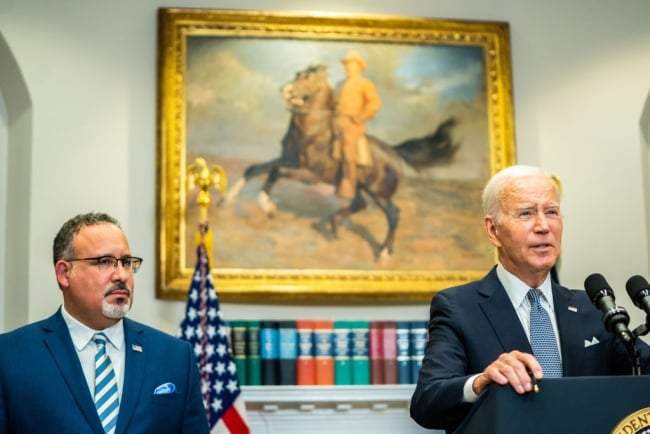You have /5 articles left.
Sign up for a free account or log in.

Critics said the Biden administration’s new Title IX rule is an illegal rewrite of the law.
Demetrius Freeman/The Washington Post/Getty Images
Outraged over the Biden administration’s decision to expand sex discrimination protections under Title IX to LGBTQ+ students, a slew of conservative groups and Republican officials plan to sue to block the new regulations from taking effect this summer.
Critics of the rule argue that the administration is essentially redefining the decades-old law that prohibits discrimination based on sex and was aimed at ensuring women and girls had equitable access to education. They also take issue with changes in the new Title IX regulations that change how colleges respond to and investigate reports of sexual misconduct and harassment, including measures that some experts say could infringe on the rights of accused students. Still, most of the criticism has been directed at the provisions protecting LGBTQ+ students.
“The Department of Education can’t flip the statute on its head by administrative fiat,” Jennifer C. Braceras, vice president for legal affairs at Independent Women’s Forum, said in a statement. “And we are confident the courts will remind the department of this basic principle and strike down this rule as unlawful.”
The Independent Women’s Forum, a national conservative group, was one of several groups that threatened legal action over the new Title IX rule, which was finalized late last week. Several Republican attorneys general also promised to sue President Biden in court over the rule. Although no lawsuits have been filed yet, statements and public comments on the rule offer a glimpse at the arguments likely to be used in federal court against the regulations.
Rachel Rouleau, legal counsel for Alliance Defending Freedom, a conservative legal organization that’s also planning to challenge the new regulations, said in a statement that the rule “illegitimately redefines ‘sex’ in federal law.”
“The Biden administration’s radical redefinition of sex turns back the clock on equal opportunity for women, threatens student safety and privacy, and undermines fairness in women’s sports,” Rouleau said. “It is a slap in the face to women and girls who have fought long and hard for equal opportunities.”
The new rule replaces what the Trump administration put in place in 2020. Title IX of the Education Amendments of 1972 protects students at all levels of education from sex-based discrimination, and the new regulations expand the definition of sex-based discrimination to include bias based on sexual orientation and gender identity and will alter how colleges and universities respond to reports of sexual harassment and misconduct, among other changes.
The broadened discrimination definition and provisions in the rule mean, for example, that students will be able to use the bathroom that aligns with their gender identity without fear of discipline. Additionally, referring to a student with the wrong pronouns could violate Title IX if the conduct is so “sufficiently severe or pervasive” that it prevents them from participating or benefiting from an educational program or activity.
The regulations codify 2021 guidance from the Education Department that outlined its interpretation that Title IX prohibits discrimination based on sexual orientation or gender identity. The Tennessee attorney general sued over that interpretation along with nearly 20 other states and won a preliminary injunction in July 2022, preventing the department from enforcing the guidance in those states.
A similar coalition of Republican attorneys general is likely to sue over the new rule.
“[Tennessee] is prepared to defend Title IX & protect against unlawful regulations that redefine what sex really means,” Tennessee attorney general Jonathan Skrmetti wrote on social media.
Some state officials aren’t even waiting for the courts to decide on the legality of the regulations. The state superintendent of education in Louisiana told K-12 school districts on Monday to hold off on changing their policies to comply with the new rule, NOLA.com reported. The provisions for LGBTQ+ students, the superintendent said, conflict with state laws such as one banning transgender girls and women from participating in the sport that matches their gender identity.
Although the U.S. Education Department is working on a separate rule that would prohibit blanket bans barring transgender students from participating in the sport consistent with their gender identity, critics say athletics will still be affected by the Title IX rule released last week.
“For any institution that is receiving federal funds, you must allow what were opportunities for women to now go to anyone who identifies as a woman but is actually a male,” said Kim Russell, a former lacrosse coach at Oberlin College who was reassigned to a different job after she made comments critical of transgender athletes. “Women’s opportunities are being taken away.”
Russell, who now serves as an ambassador for the Independent Women’s Forum, added that the expanded harassment and discrimination definition infringes on the First Amendment, a concern raised by other conservative groups.
Department officials pushed back on those concerns in the final rule, saying that harassing speech can only violate Title IX if the conduct “‘limits or denies’ a person’s ability to participate” in an education program or activity.
“The department also strongly disagrees with claims that students will be, in the words of some commenters, subjected to ‘federally mandated censorship,’ a ‘civility code,’ or a ‘speech ban,’ or that the regulations will essentially prohibit ‘hate speech,’ ‘stifle the ‘marketplace of ideas’ on campuses,’ or enable people to ‘weaponize’ Title IX against those with whom they disagree on political, religious, and social issues,” officials wrote. “There is no basis for those claims in the text of the proposed or final regulations or our explanation of it.”
‘After the Damage Has Been Done’
Whether the potential legal challenges will be successful is unclear, especially since they haven’t been filed. However, previous challenges to Title IX regulations could offer some hints. Several lawsuits in 2020 challenging the Trump Title IX rule weren’t successful as the plaintiffs— Democratic attorneys general and advocacy groups supporting sexual assault survivors—either didn’t prove they had standing or that they would suffer irreparable harm if the regulations took effect.
Andrew T. Miltenberg, a lawyer at Nesenoff & Miltenberg who specializes in Title IX cases and represents primarily students accused of misconduct, said he doesn’t see the initial legal challenges as “the true attack.” Instead, the more potentially powerful lawsuits will be those filed after colleges and K-12 schools begin to carry out the new rule.
“If you want to have a compelling argument that may have the impact of changing the way one of these sections are handled, it should be, unfortunately, after the damage has been done,” Miltenberg said.
He’s more concerned about the provisions changing how colleges respond to and investigate reports of sexual misconduct. The final rule puts incidents that take place off-campus or in study abroad programs under the college’s jurisdiction. That expansion, he said, is going to be problematic and lead to legal challenges.
Miltenberg also worries about the department’s decision to end the current requirement that colleges hold live hearings with an opportunity for cross-examination to allow those accused to confront their accusers.
“That’s something that is going to be tested very quickly, as soon as someone loses a Title IX case,” he said.
Still, while Miltenberg sees problems with the new regulations, he said it’s not time to panic.
“I’m interested to see how they are applied, and to the extent they’re applied in an inconsistent or unfair manner, or in a way that is not equitable to the parties, we’ll challenge them in court,” he said. “But I think we have a little bit before we get there.”
‘Frustrating and Extremely Harmful’
Tracey Vitchers, executive director of It’s On Us, a national organization working to combat campus sexual assault that supports the new Title IX rule, said the Education Department faced a tough job in crafting Title IX regulations that would address the concerns of the various stakeholders and hold up to legal scrutiny. She thinks the department did its job and that the rule will withstand the potential legal challenges.
The criticism directed toward the LGBTQ+ protections is “frustrating and extremely harmful,” she said.
“It’s on Us is committed to ensuring that our LGBTQIA students do understand that they have protections underneath this regulation and that we are here to support them as they continue to navigate this regulatory change and have their rights finally acknowledged,” she said.
Other advocacy groups focused on gender justice and LGBTQ+ issues have applauded the final rule.
“We call on President Biden and his administration to finish the job by providing further clarification for inclusive protections in athletics and robustly enforcing Title IX to ensure all students, including transgender, nonbinary, and intersex student athletes, realize the law’s full protections—because all students deserve the freedom to be themselves, to learn and to do their best at school,” a coalition of more than 20 organizations, including the Human Rights Campaign, wrote in a joint statement.








